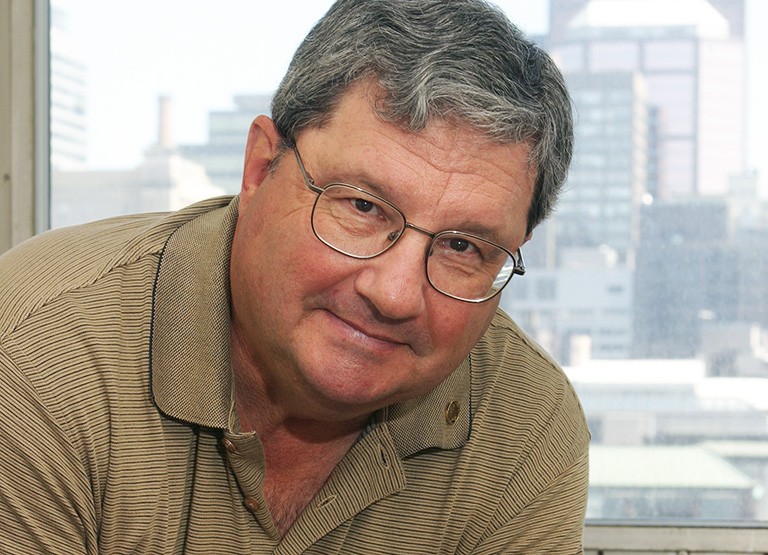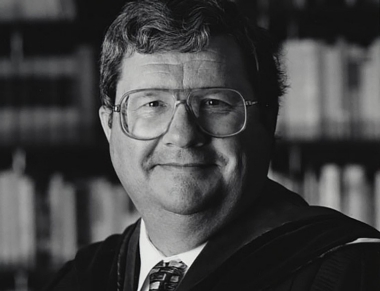Crucial time
Bertrand helmed the university at a critical moment. The fallout from the Fabrikant Affair had led to a shakeup in the Faculty of Engineering and Computer Science and the sudden departure of the rector, Patrick Kenniff, and two vice-rectors in 1994.
In an interview with Concordia’s Thursday Report at the end of his interim term in 1995, Bertrand acknowledged that the early days of his new role posed a challenge. “There was a lot of movement at first to put out fires and to try to control the situation. And then, as we progressed a bit into the year, we tried to establish some goals, particularly to establish openness and transparency,” he recalled.
Bertrand reflected on his experience as chief executive. “What surprised me the most was how much influence you can have by setting a tone. My style, I hope, is direct but civil, and always honest. There’s no doubt that it’s lonely at the top,” he said.
“I was lucky, I had a very good Office of the Rector staff, but there are times when, like it or not, there’s only one person who has to bite the bullet. That’s okay, but it’s not always pleasant.”
He also discussed his achievements. “I’m very proud of the open budget process we got into place and made work. We began to put the Faculty of Engineering and Computer Science back where it should be, given its strengths. And we’ve got the Code of Ethics in place now, and the document on educational equity, and I’m proud of that.”
Despite the burden of two portfolios, he kept teaching throughout. “I taught the course I’d agreed to teach because it had already filled,” Bertrand recounted. “And I really love teaching. It added an hour and a half of sanity twice a week to my life.”
That love showed in the classroom, where he enjoyed a great reputation. Among Bertrand’s former students was Donald Meehan (BA 72), who went on to found one of the top sports agencies in the world, Newport Sports Management Inc. “I really had a great experience at Concordia and really wonderful teachers,” Meehan told Concordia University Magazine in 2017. “I still remember a history professor, Charles Bertrand. I would love to see him again.”
Praise from colleagues and friends
In his three and half decades at Concordia, Bertrand worked with and befriended countless fellow faculty, staff, students and others.
Hal Proppe, professor in Concordia’s Department of Mathematics and Statistics, served alongside Bertrand as interim vice-rector of institutional relations and finance from 1994 to 1996.
“While he was interim rector, Chuck showed tremendous leadership in navigating the university through an extremely difficult period to a point of financial and structural stability. He instilled confidence in the entire Concordia community, the Board of Governors, government officials and the media,” Proppe says.
“During this period, there were several serious problems with the government and external agencies that he resolved through skillful diplomacy and his experience as an academic administrator.”
Bertrand impressed Proppe in other ways, too. “We were already friends at the time but I was surprised to discover that he was bilingual. After all, in spite of his name, he came to Concordia as an American. I still recall being impressed by his fluency the first time I heard him give an interview on a French radio station as rector,” he says.
“Chuck was an excellent historian and I learned a number of historical perspectives and ideologies from him. As a mathematician, I wanted to reciprocate but, unfortunately, he was not very interested — I tried once but after a few minutes he said he had leave for an important meeting,” Proppe adds.
“People admired him for being fair, honest and straightforward.”
Catherine Mackenzie, professor emeritus of art history, is another colleague who remembers Bertrand fondly.
“I worked with Dr. Bertrand while he was dean of the Faculty of Arts and Science and, briefly, while he was vice-rector of services. I was always invigorated by his sparkling intelligence, his honesty — even when it stung — and his fearlessness in taking up difficult issues,” she says.
“He was passionately committed to Concordia. I think, or better put, know, that we were fortunate indeed he took on the role of interim rector during an extremely difficult time in the history of the institution. I feel privileged to have known him.”
During his days at the university, Bertrand struck many personal friendships as well. “He was a very down-to-earth man and he treated everyone equally,” says former Concordia staff member Julie Blumer, who retired in 2017 after 40 years at the university.
Blumer and her husband became close friends with Bertrand and his spouse, Kathleen O’Connell (BA 89), department administrator in Concordia’s Department of Psychology. She reports that Bertrand was also a great supporter of the Concordia Stingers football and basketball teams.
Deborah MacFadden (BA 78) was another long-time Concordia staff person and wife of the late Dennis Murphy (BA 67), who had been a professor in the university’s Department of Communication Studies.
“Chuck Bertrand was a good friend and colleague of Dennis. As lovers of history, they had many lively discussions on Stalinism, dictatorships and propaganda over the years,” she says. “Concordia played a big role in Chuck’s life, and he never ceased to be engaged in the politics, people and future of the university.”
Longtime Concordia administrator Garry Milton, who retired in 2009 after 37 years at the university, was executive assistant to Bertrand when he was interim rector. “Being a very close observer, I truly believe that the work and personal sacrifices Chuck made while interim rector paved the way for Concordia’s successes that followed,” Milton says.
“I remember well Chuck’s last day as rector. After saying fond farewells to his staff and receiving a call from the chair of the Board, Chuck picked up his coffee cup, packed up a few things he had been working on, left the office and headed back to the GM Building, where he continued his responsibilities as vice-rector,” Milton recalls. “That was Chuck: no fanfare, getting on with what had to be done, always committed to Concordia.”
Milton also recounts talking to a neighbour who was a former Concordia staff member and student. “She mentioned that one of her fondest memories as a Concordia student was of a history professor named Charles Bertrand,” he says.
“After commenting on how much his teaching had inspired her, she told me that Chuck helped her through a difficult time in her life after losing her husband while in his class. She was very clear that it was Chuck’s encouragement that had inspired her to not only finish his class but also complete her degree.”
Learn more about how Concordia offers support in times of need.
 Charles Bertrand, pictured in 2003. Concordia President Graham Carr: “Chuck was extremely supportive and a great mentor to young colleagues, including me.”
Charles Bertrand, pictured in 2003. Concordia President Graham Carr: “Chuck was extremely supportive and a great mentor to young colleagues, including me.”



